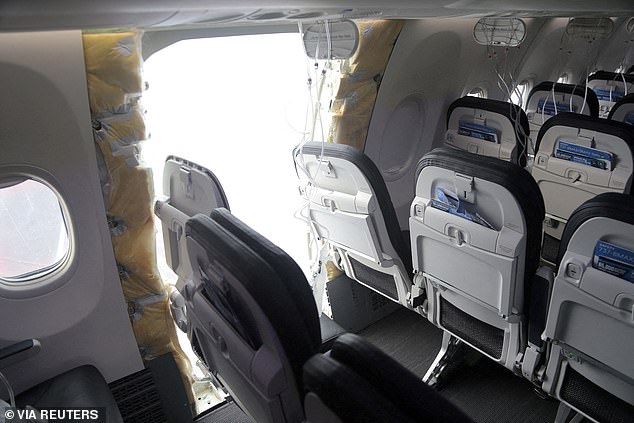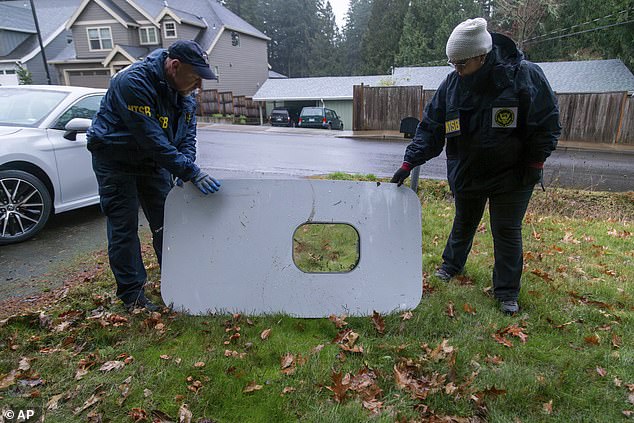Boeing is ‘not cooperating’ with NTSB investigation into mid-air blowout on Alaska Airlines flight
The head of the National Transportation Safety Board has accused Boeing of failing to provide some key data requested in the ongoing investigation into the Alaska Airlines 737 Max cabin door emergency.
NTSB Chairman Jennifer Homendy said investigators have sought the names of the 25 people working on door plugs at a Boeing factory in Renton, Washington, but have not received them from Boeing.
“It’s absurd that two months later we still don’t have it,” Homendy said Wednesday during a Senate Commerce Committee hearing.
Boeing maintained that it initially provided the NTSB with some names of Boeing employees, including door specialists it believed might have relevant information.
“We have now provided the full list of individuals from the 737 door team, in response to a recent request,” the aircraft maker said, adding: “If the door plug removal were undocumented, there would be no documentation to to share.’
NTSB Chairman Jennifer Homendy said investigators have sought the names of the 25 people working on door plugs at a Boeing factory in Renton, Washington, but have not received them

Bolts appear to be missing from the door plug that blew out of a Boeing 737 MAX during an Alaska Airlines flight on January 5
“We will continue to cooperate fully and transparently with the NTSB’s investigation,” Boeing’s statement added.
Earlier Wednesday, Homendy said she was frustrated.
“It’s not a lack of trying,” she said, adding that the information sought includes the precise agency that worked on the improperly installed door plug in September.
The agency is also seeking documentation related to opening and closing the door plug and removing missing key bolts.
Homendy said the NTSB has “requested documentation regarding the door plug multiple times” in recent months.
In addition, she told Reuters that the NTSB plans to hold a multi-day investigative hearing into the MAX 9, likely in late summer, that will include testimony from Boeing employees and fuselage manufacturer Spirit AeroSystems.
Homendy confirmed that inspections of all other MAX 9 aircraft in service found no other missing bolts.
The planemaker has made efforts to explain and strengthen safety procedures since the January air incident that led to the FAA grounding the MAX for 9 weeks.
The company has been the subject of increased scrutiny from regulators and major airlines concerned about the quality of its jet production.

The door plug was found in the backyard of a home after it blew out on January 5
Homendy said investigators began interviews at the Boeing factory in Renton on Sunday and will continue throughout the week. At this time, the NTSB does not know which employees removed the bolts and failed to reinstall them, she said.
“The NTSB needs to interview the employees,” she said. “We are not concerned with the NTSB’s fault. The only way we can ensure safety is to find out what happened, what was done, what wasn’t done and what policies are in place.”
Homendy said she was not suggesting any wrongdoing on Boeing’s part.
Senator Ted Cruz, the top Republican on the Commerce Committee, called it “completely unacceptable” that the NTSB did not receive full cooperation from Boeing.
Homendy also confirmed that the MAX 9 door plug had moved during previous flights, citing markings on the door.
There were 154 previous flights of Alaska Airlines’ Boeing 737 MAX 9 before the January 5 air emergency.
“There were very small movements until it finally came out,” Homendy said, adding that tests showed “you could see a little gap near the end,” but it wasn’t clear how noticeable it was.
The Federal Aviation Administration said this week that its 737 MAX production audit at Boeing and Spirit AeroSystems found multiple instances in which the companies allegedly failed to meet production quality control requirements.
The FAA has given Boeing 90 days to come up with a quality improvement plan.
